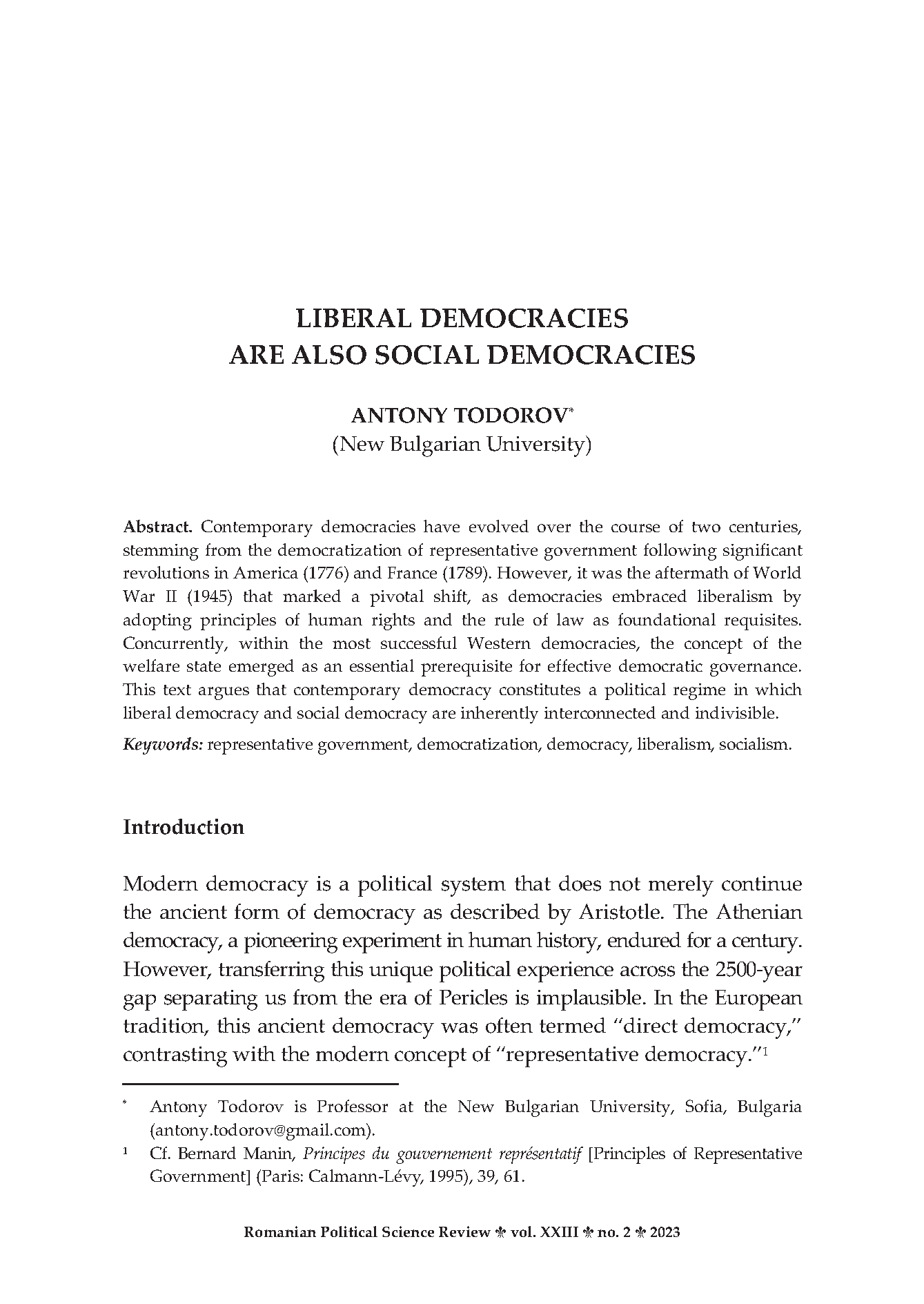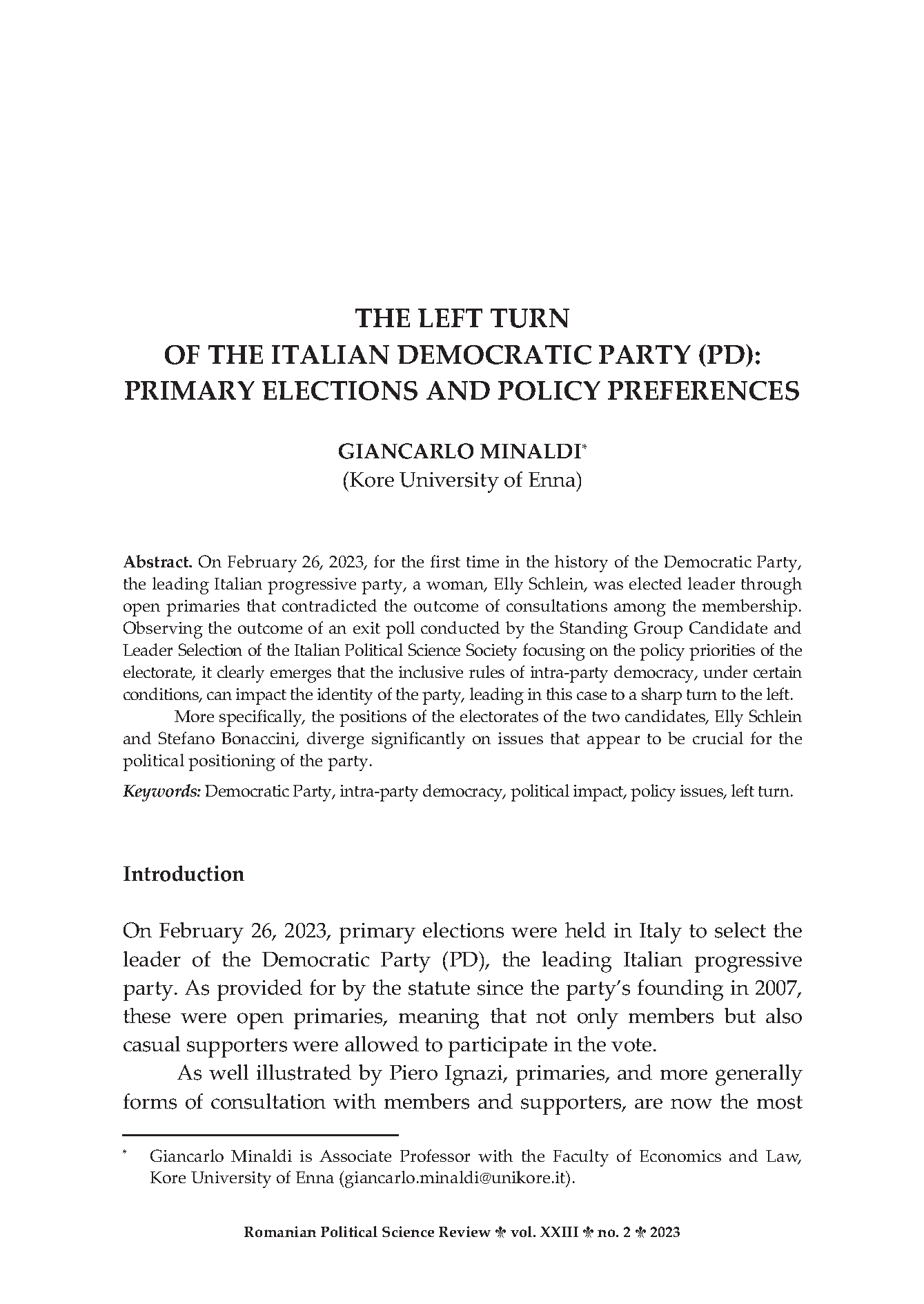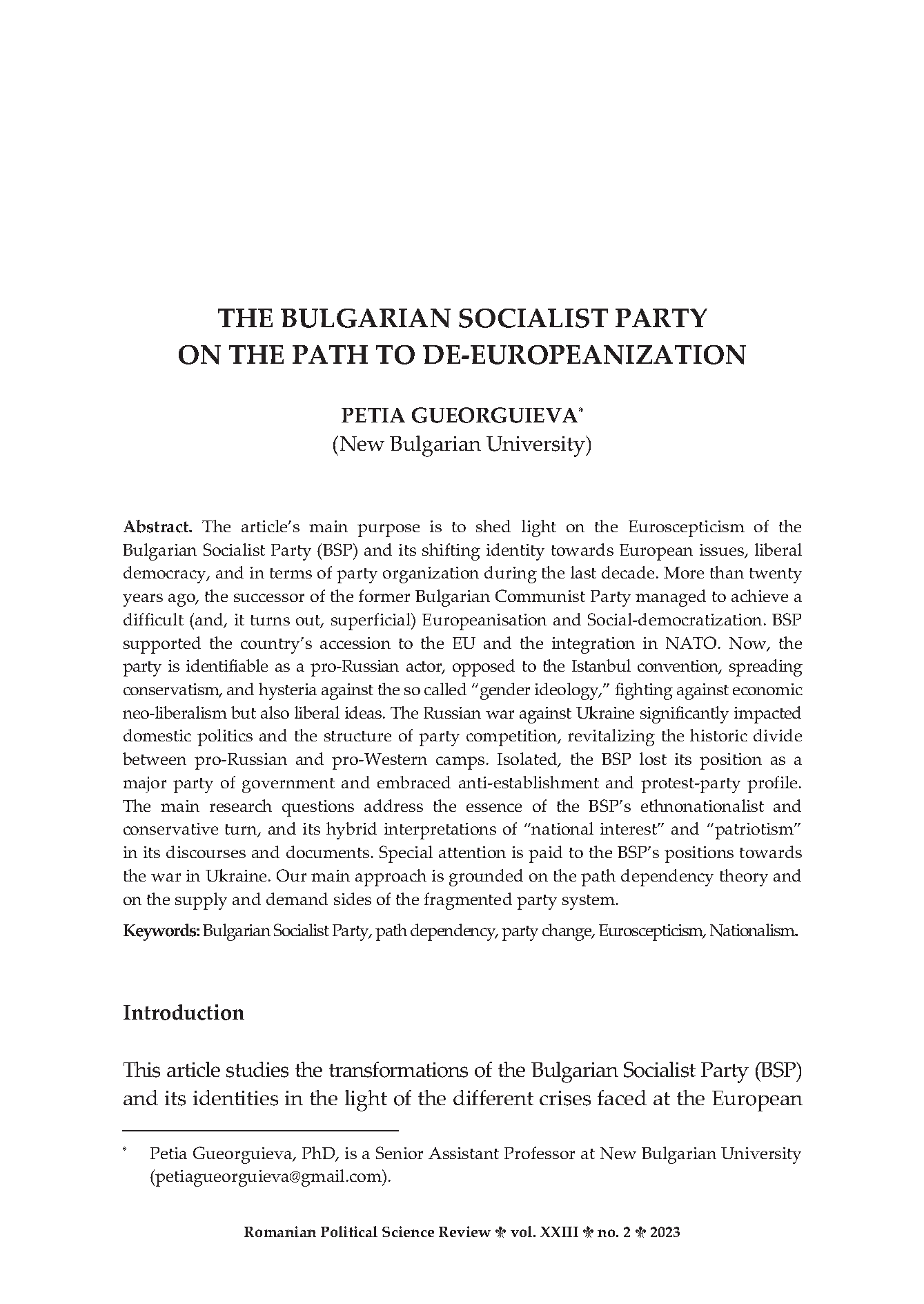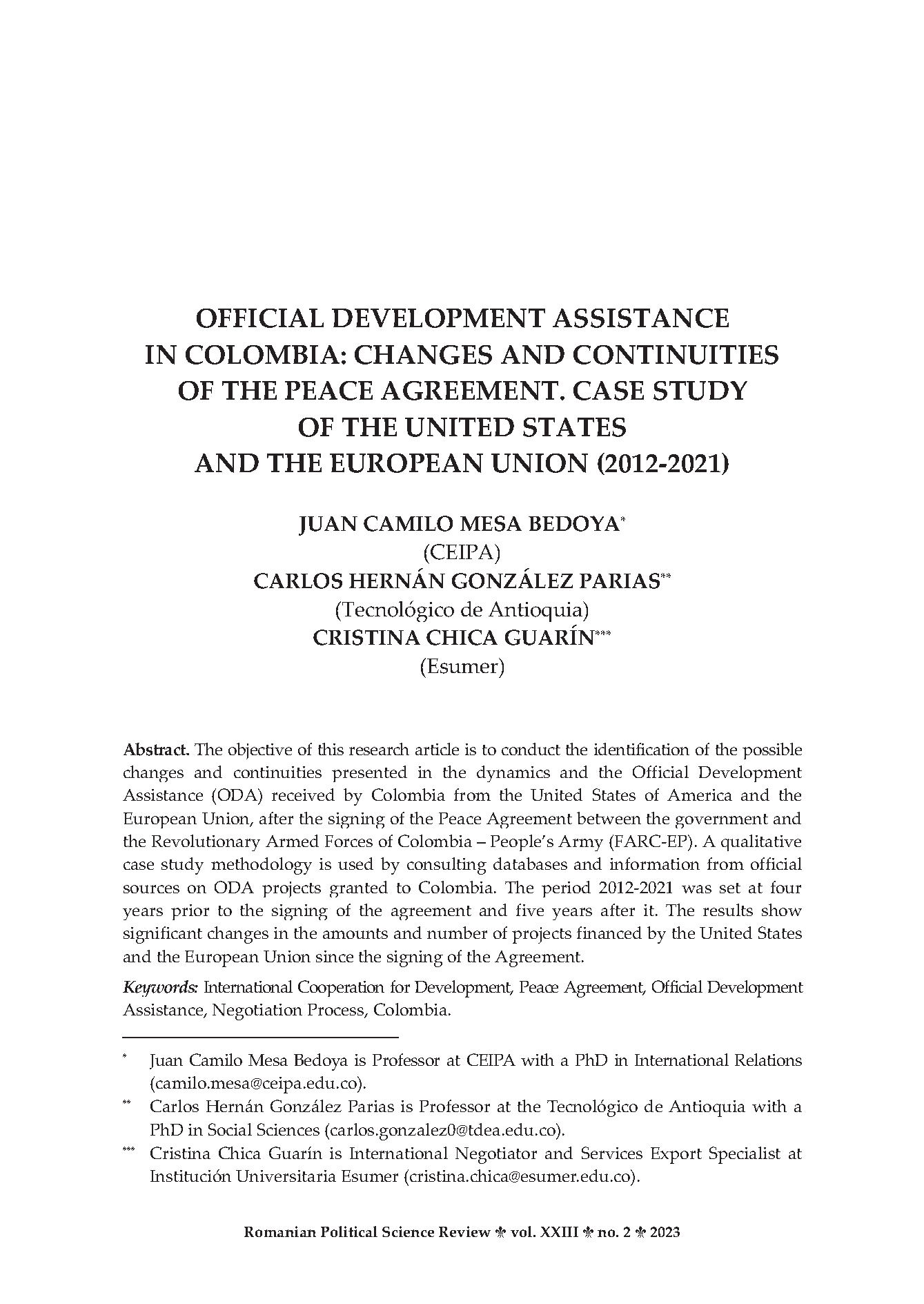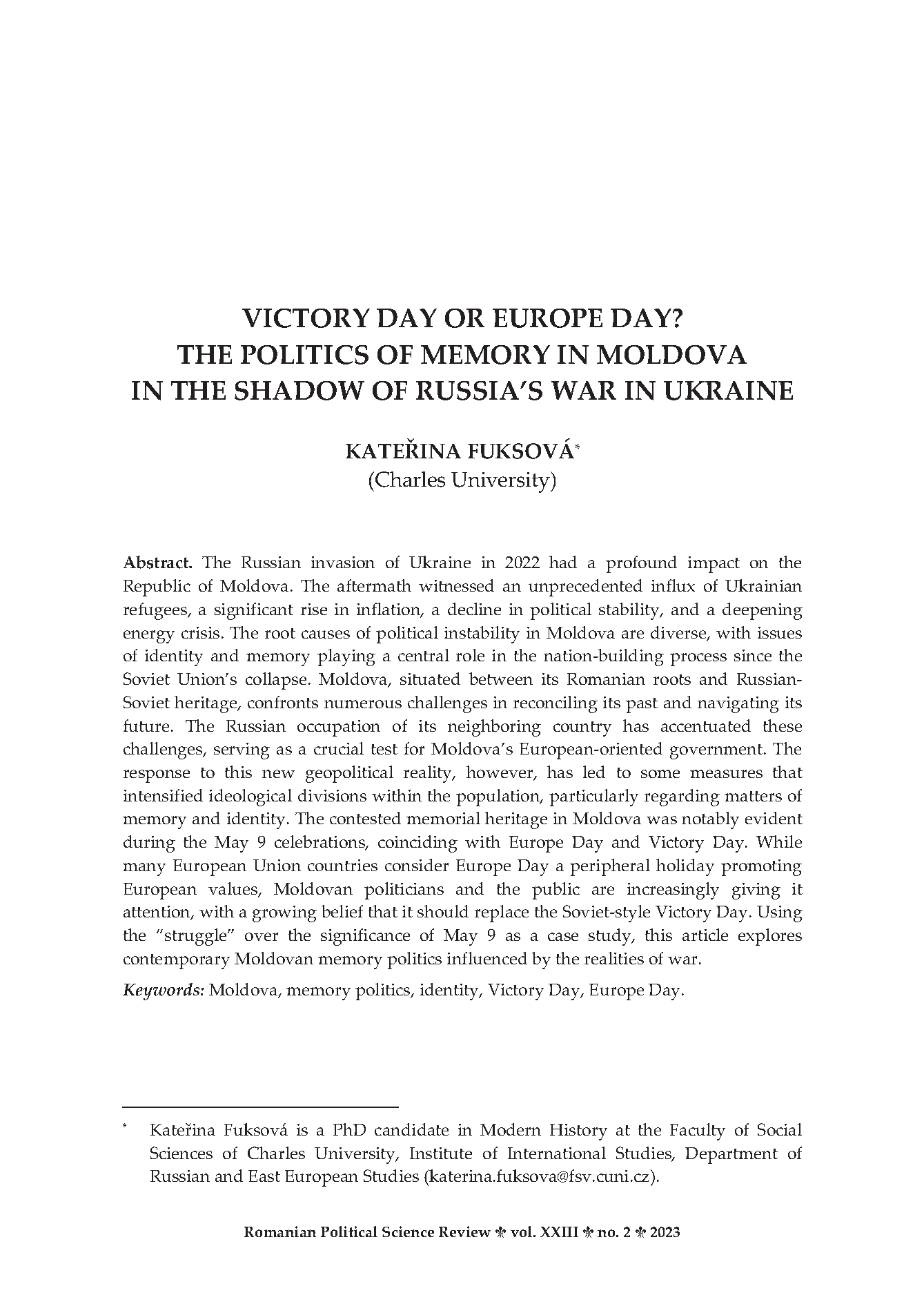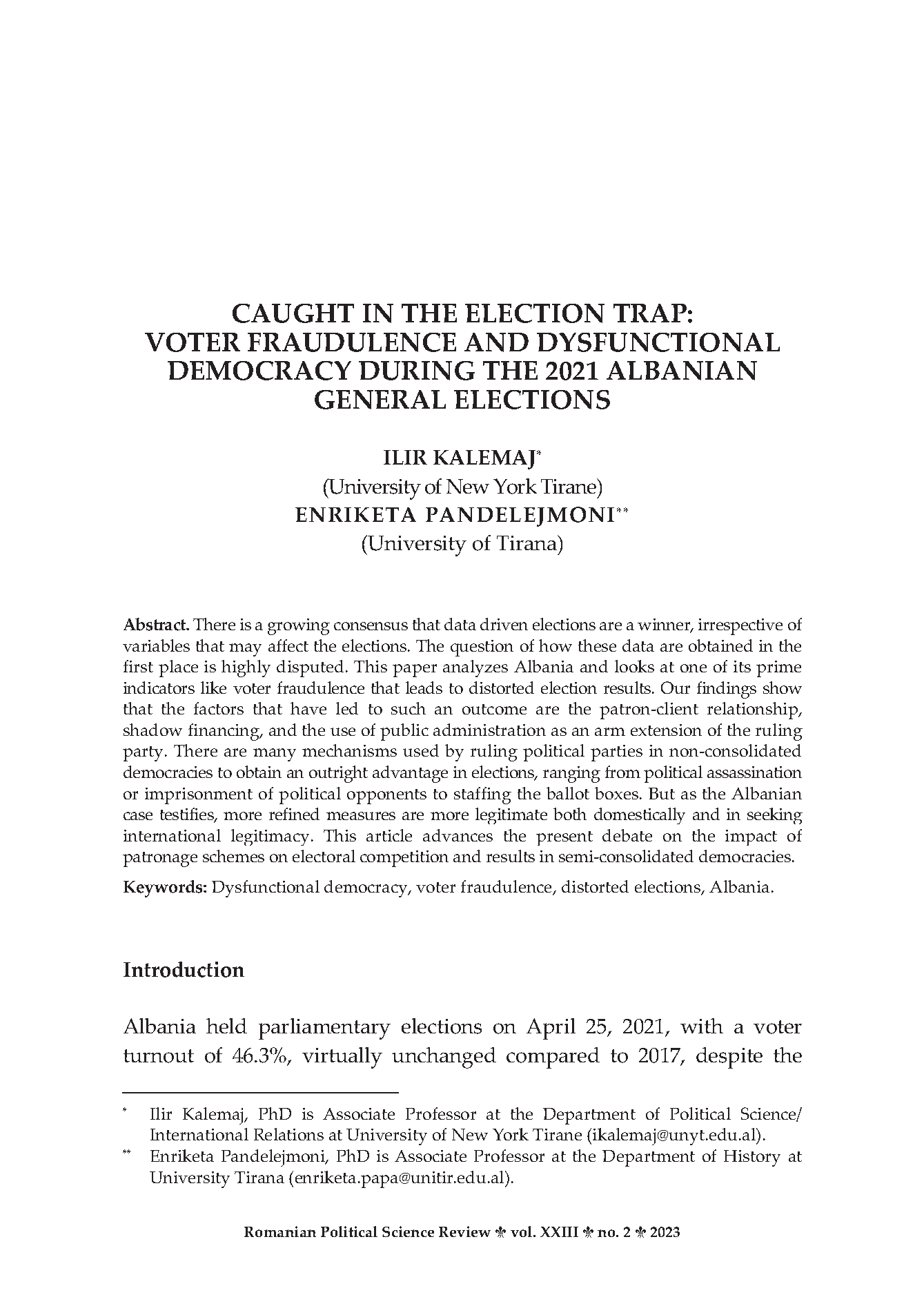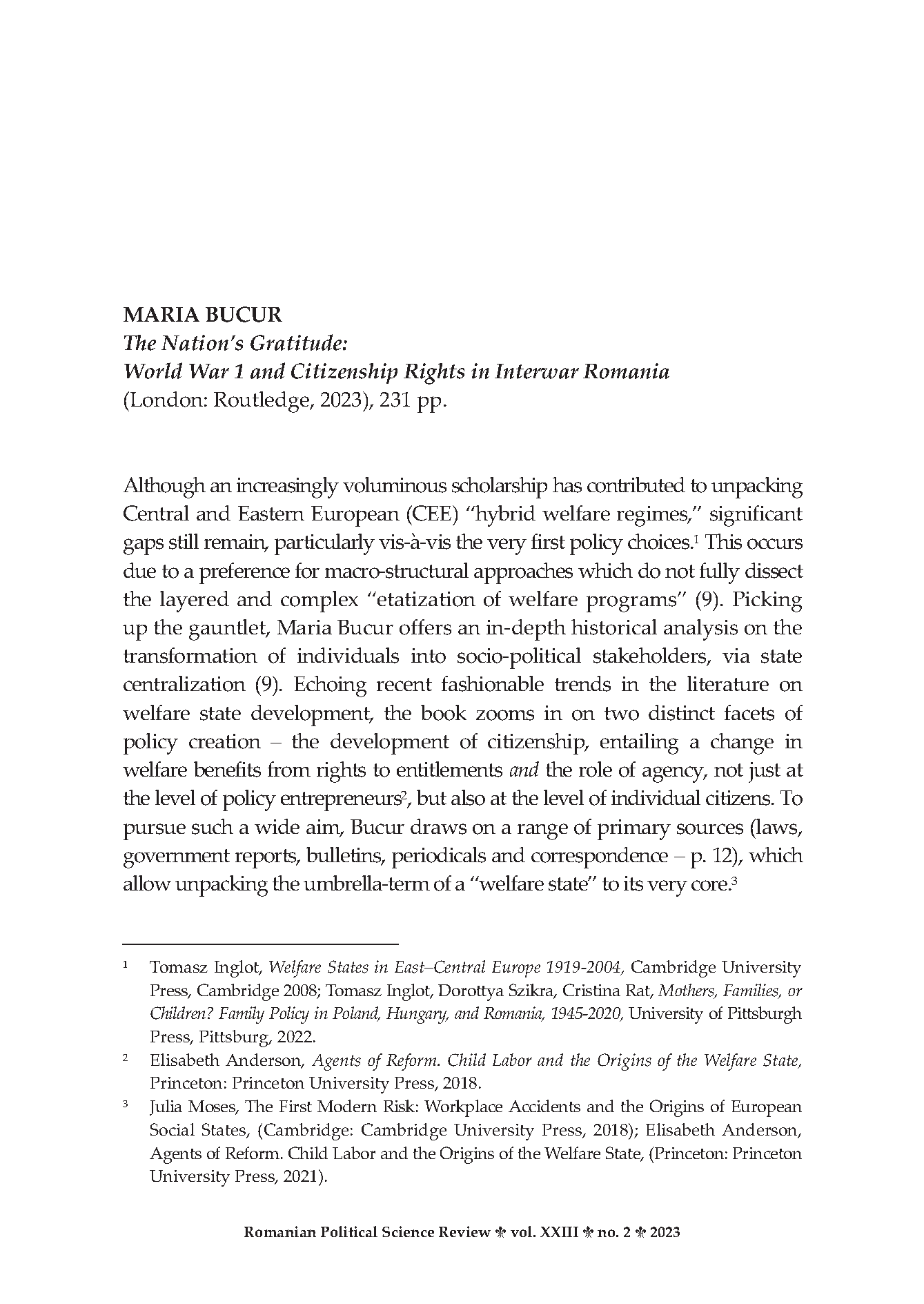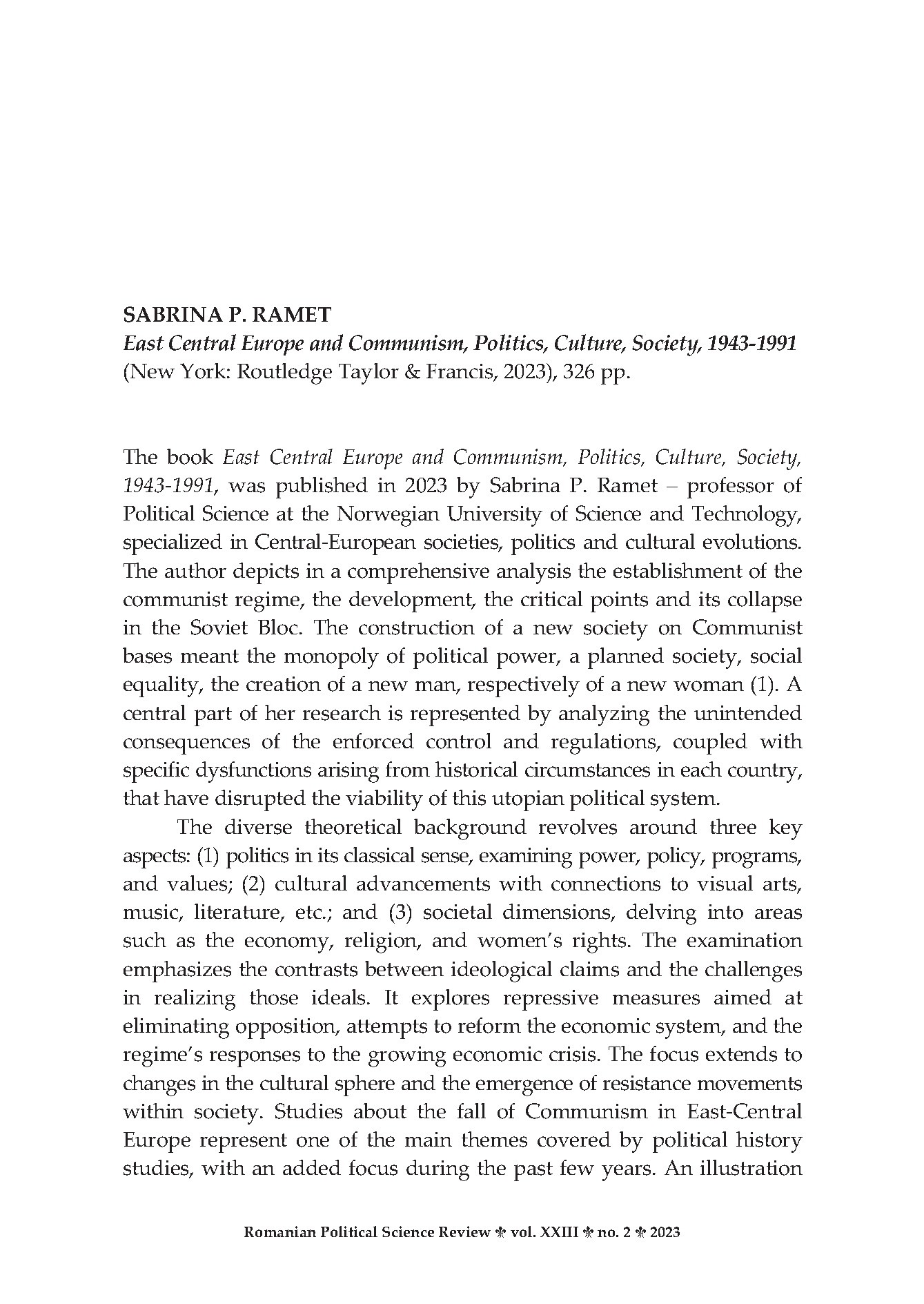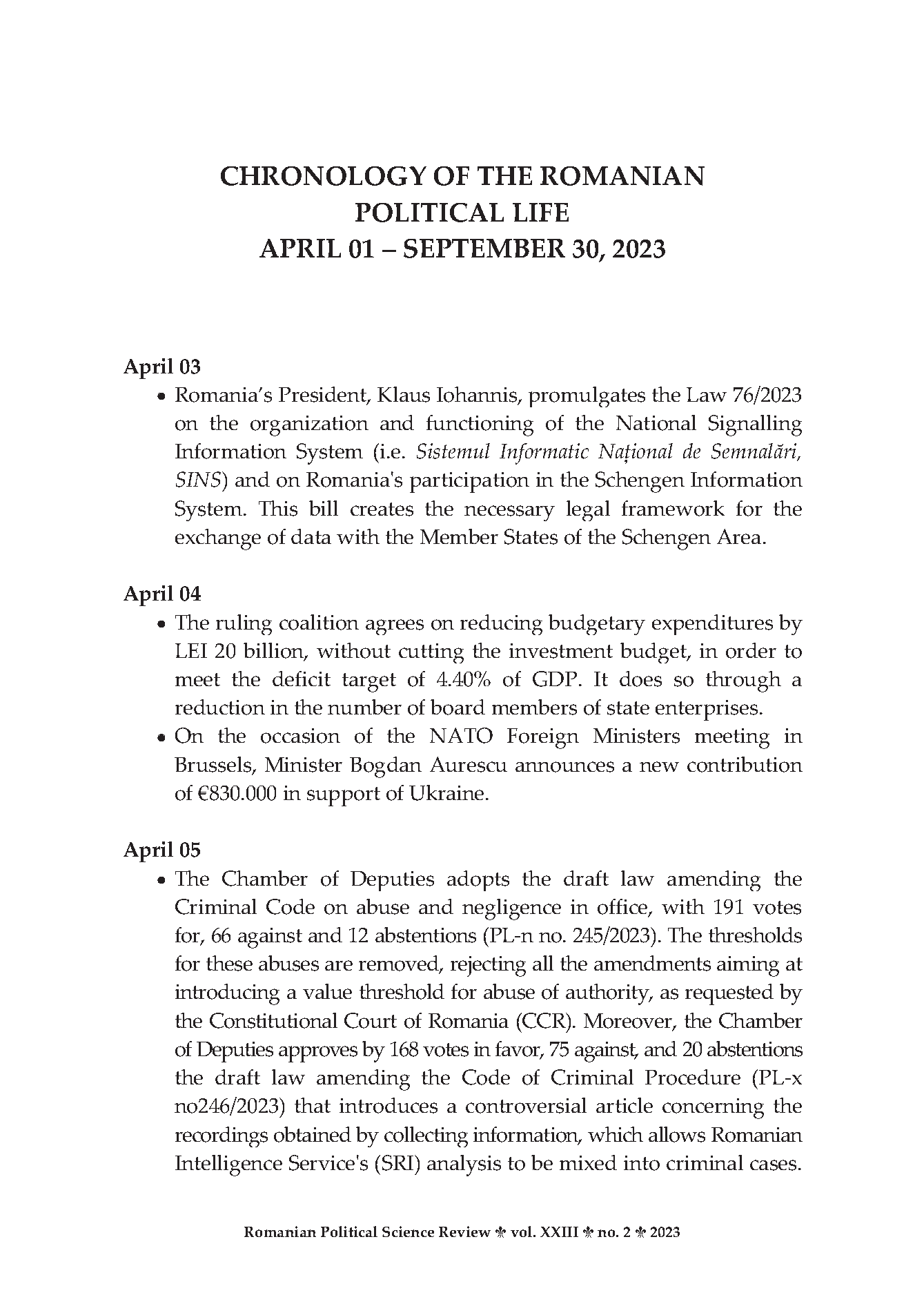Volum 23 Nr. 2 (2023): Studia Politica. Romanian Political Science Review

The end of the Cold War, and the extinction of communism both as an ideology and a practice of government, not only have made possible an unparalleled experiment in building a democratic order in Central and Eastern Europe, but have opened up a most extraordinary intellectual opportunity: to understand, compare and eventually appraise what had previously been neither understandable nor comparable. Studia Politica. Romanian Political Science Review was established in the realization that the problems and concerns of both new and old democracies are beginning to converge. The journal fosters the work of the first generations of Romanian political scientists permeated by a sense of critical engagement with European and American intellectual and political traditions that inspired and explained the modern notions of democracy, pluralism, political liberty, individual freedom, and civil rights.
Believing that ideas do matter, the Editors share a common commitment as intellectuals and scholars to try to shed light on the major political problems facing Romania, a country that has recently undergone unprecedented political and social changes. They think of Studia Politica. Romanian Political Science Review as a challenge and a mandate to be involved in scholarly issues of fundamental importance, related not only to the democratization of Romanian polity and politics, to the "great transformation" that is taking place in Central and Eastern Europe, but also to the make-over of the assumptions and prospects of their discipline. They hope to be joined in by those scholars in other countries who feel that the demise of communism calls for a new political science able to reassess the very foundations of democratic ideals and procedures.
Număr complet
Articles
-
LIBERAL DEMOCRACIES ARE ALSO SOCIAL DEMOCRACIES
Rezumat
Contemporary democracies have evolved over the course of two centuries, stemming from the democratization of representative government following significant revolutions in America (1776) and France (1789). However, it was the aftermath of World War II (1945) that marked a pivotal shift, as democracies embraced liberalism by adopting principles of human rights and the rule of law as foundational requisites. Concurrently, within the most successful Western democracies, the concept of the welfare state emerged as an essential prerequisite for effective democratic governance. This text argues that contemporary democracy constitutes a political regime in which liberal democracy and social democracy are inherently interconnected and indivisible.
-
THE LEFT TURN OF THE ITALIAN DEMOCRATIC PARTY (PD): PRIMARY ELECTIONS AND POLICY PREFERENCES
Rezumat
On February 26, 2023, for the first time in the history of the Democratic Party, the leading Italian progressive party, a woman, Elly Schlein, was elected leader through open primaries that contradicted the outcome of consultations among the membership. Observing the outcome of an exit poll conducted by the Standing Group Candidate and Leader Selection of the Italian Political Science Society focusing on the policy priorities of the electorate, it clearly emerges that the inclusive rules of intra-party democracy, under certain conditions, can impact the identity of the party, leading in this case to a sharp turn to the left.
More specifically, the positions of the electorates of the two candidates, Elly Schlein and Stefano Bonaccini, diverge significantly on issues that appear to be crucial for the political positioning of the party.
-
THE BULGARIAN SOCIALIST PARTY ON THE PATH TO DE-EUROPEANIZATION
Rezumat
The article's main purpose is to shed light on the Euroscepticism of the Bulgarian Socialist Party (BSP) and its shifting identity towards European issues, liberal democracy, and in terms of party organization during the last decade. More than twenty years ago, the successor of the former Bulgarian Communist Party managed to achieve a difficult (and, it turns out, superficial) Europeanisation and Social-democratization. BSP supported the country's accession to the EU and the integration in NATO. Now, the party is identifiable as a pro-Russian actor, opposed to the Istanbul convention, spreading conservatism, and hysteria against the so called "gender ideology," fighting against economic neo-liberalism but also liberal ideas. The Russian war against Ukraine significantly impacted domestic politics and the structure of party competition, revitalizing the historic divide between pro-Russian and pro-Western camps. Isolated, the BSP lost its position as a major party of government and embraced anti-establishment and protest-party profile. The main research questions address the essence of the BSP's ethnonationalist and conservative turn, and its hybrid interpretations of "national interest" and "patriotism" in its discourses and documents. Special attention is paid to the BSP's positions towards the war in Ukraine. Our main approach is grounded on the path dependency theory and on the supply and demand sides of the fragmented party system.
-
OFFICIAL DEVELOPMENT ASSISTANCE IN COLOMBIA: CHANGES AND CONTINUITIES OF THE PEACE AGREEMENT. CASE STUDY OF THE UNITED STATES AND THE EUROPEAN UNION (2012-2021)
Rezumat
The objective of this research article is to conduct the identification of the possible changes and continuities presented in the dynamics and the Official Development Assistance (ODA) received by Colombia from the United States of America and the European Union, after the signing of the Peace Agreement between the government and the Revolutionary Armed Forces of Colombia - People's Army (FARC-EP). A qualitative case study methodology is used by consulting databases and information from official sources on ODA projects granted to Colombia. The period 2012-2021 was set at four years prior to the signing of the agreement and five years after it. The results show significant changes in the amounts and number of projects financed by the United States and the European Union since the signing of the Agreement.
-
VICTORY DAY OR EUROPE DAY? THE POLITICS OF MEMORY IN MOLDOVA IN THE SHADOW OF RUSSIA'S WAR IN UKRAINE
Rezumat
The Russian invasion of Ukraine in 2022 had a profound impact on the Republic of Moldova. The aftermath witnessed an unprecedented influx of Ukrainian refugees, a significant rise in inflation, a decline in political stability, and a deepening energy crisis. The root causes of political instability in Moldova are diverse, with issues of identity and memory playing a central role in the nation-building process since the Soviet Union's collapse. Moldova, situated between its Romanian roots and Russian- Soviet heritage, confronts numerous challenges in reconciling its past and navigating its future. The Russian occupation of its neighboring country has accentuated these challenges, serving as a crucial test for Moldova's European-oriented government. The response to this new geopolitical reality, however, has led to some measures that intensified ideological divisions within the population, particularly regarding matters of memory and identity. The contested memorial heritage in Moldova was notably evident during the May 9 celebrations, coinciding with Europe Day and Victory Day. While many European Union countries consider Europe Day a peripheral holiday promoting European values, Moldovan politicians and the public are increasingly giving it attention, with a growing belief that it should replace the Soviet-style Victory Day. Using the "struggle" over the significance of May 9 as a case study, this article explores contemporary Moldovan memory politics influenced by the realities of war.
-
CAUGHT IN THE ELECTION TRAP: VOTER FRAUDULENCE AND DYSFUNCTIONAL DEMOCRACY DURING THE 2021 ALBANIAN GENERAL ELECTIONS
Rezumat
There is a growing consensus that data driven elections are a winner, irrespective of variables that may affect the elections. The question of how these data are obtained in the first place is highly disputed. This paper analyzes Albania and looks at one of its prime indicators like voter fraudulence that leads to distorted election results. Our findings show that the factors that have led to such an outcome are the patron-client relationship, shadow financing, and the use of public administration as an arm extension of the ruling party. There are many mechanisms used by ruling political parties in non-consolidated democracies to obtain an outright advantage in elections, ranging from political assassination or imprisonment of political opponents to staffing the ballot boxes. But as the Albanian case testifies, more refined measures are more legitimate both domestically and in seeking international legitimacy. This article advances the present debate on the impact of patronage schemes on electoral competition and results in semi-consolidated democracies.
Book Reviews
-
MARIA BUCUR The Nation's Gratitude: World War 1 and Citizenship Rights in Interwar Romania London: Routledge, 2023, 231 pp.
Rezumat
Although an increasingly voluminous scholarship has contributed to unpacking Central and Eastern European (CEE) "hybrid welfare regimes," significant gaps still remain, particularly vis-â-vis the very first policy choices. This occurs due to a preference for macro-structural approaches which do not fully dissect the layered and complex "etatization of welfare programs". Picking up the gauntlet, Maria Bucur offers an in-depth historical analysis on the transformation of individuals into socio-political stakeholders, via state centralization.
-
SABRINA P. RAMET, East Central Europe and Communism, Politics, Culture, Society, 1943-1991 New York: Routledge Taylor & Francis, 2023, 326 pp.
Rezumat
The book East Central Europe and Communism, Politics, Culture, Society, 1943-1991, was published in 2023 by Sabrina P. Ramet - professor of Political Science at the Norwegian University of Science and Technology, specialized in Central-European societies, politics and cultural evolutions. The author depicts in a comprehensive analysis the establishment of the communist regime, the development, the critical points and its collapse in the Soviet Bloc.
Annals
-
CHRONOLOGY OF THE ROMANIAN POLITICAL LIFE APRIL 01 - SEPTEMBER 30, 2023
Rezumat
CHRONOLOGY OF THE ROMANIAN POLITICAL LIFE
APRIL 01 - SEPTEMBER 30, 2023

